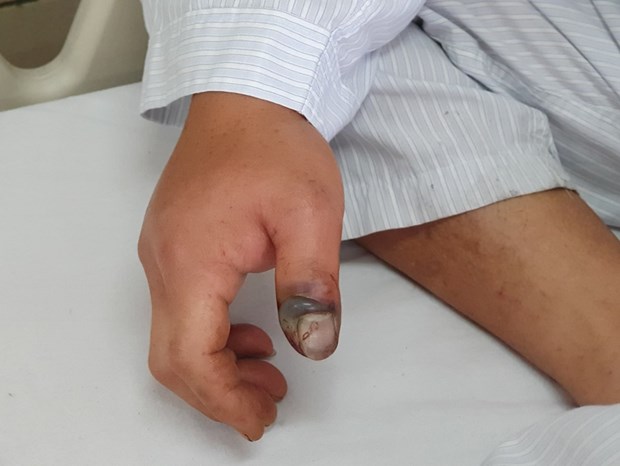 Society
Society

At least eight people who suffered venomous snake bites are currently being treated at the Poison Control Centre in Hà Nội's Bạch Mai General Hospital.

|
| A victim of a venomous snake bite. — Photo Bạch Mai Hospital |
HÀ NỘI — As summer arrives, so does an increase in the number of people bitten by venomous snakes.
At least eight people who suffered venomous snake bites are currently being treated at the Poison Control Centre in Ha Noi's Bạch Mai General Hospital.
Dr Nguyễn Trung Nguyên, director of the Poison Control Centre, said that over the past week, people bitten by venomous snake have been rushed to the hospital every day.
Last Thursday evening, a 32-year-old patient in Phú Thọ was hospitalised after being bitten by a green snake in his garden.
The patient received first aid at home and was taken to Hùng Vương General Hospital and then transferred to Bạch Mai Hospital.
Another victim is a man from Khoái Châu District, Hưng Yên Province.
He was bitten by a cobra on one of his right fingers while he was cleaning up a pile of bricks.
He was also transferred to the Poison Control Centre after being taken to provincial General Hospital as his finger experienced significant swelling and redness as well as a throbbing pain.
"We always see an uptick in snake bites when the weather starts to get warmer, especially from April to November,” Dr Nguyên said.
He said there are many types of venomous snakes in Việt Nam and each type of snake produces different venom, meaning there are different first-aid measures and treatment options depending on the type of venomous snake.
"The biggest mistake of most victims is the use of traditional treatment methods in first aid when being bitten by a snake,” said Nguyên.
Patients rush to health facilities when they have symptoms of respiratory failure such as cyanosis, muscle contraction and difficulty breathing, he said.
If bitten, he advises staying calm, immobilising the limb to keep it as still as possible, perhaps with a splint, to reduce the spread of venom and getting to a health facility immediately.
People should clear undergrowth and keep their houses tidy and clean and wear protective boots, long clothes and carry a stick when working on the farm or in the forest.
Biologists say snakes don't bite unless they feel threatened and most bites occur when people are trying to disturb or kill a snake. — VNS




